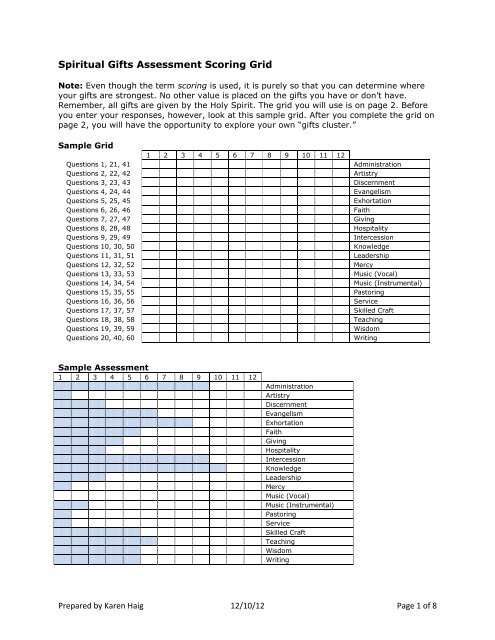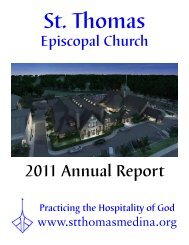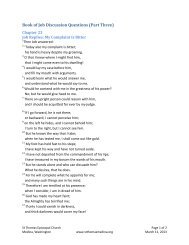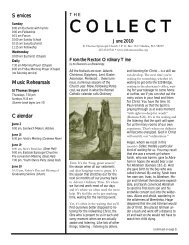Spiritual Gifts Assessment Scoring Grid - St. Thomas Episcopal Church
Spiritual Gifts Assessment Scoring Grid - St. Thomas Episcopal Church
Spiritual Gifts Assessment Scoring Grid - St. Thomas Episcopal Church
Create successful ePaper yourself
Turn your PDF publications into a flip-book with our unique Google optimized e-Paper software.
<strong>Spiritual</strong> <strong>Gifts</strong> <strong>Assessment</strong> <strong>Scoring</strong> <strong>Grid</strong><br />
Note: Even though the term scoring is used, it is purely so that you can determine where<br />
your gifts are strongest. No other value is placed on the gifts you have or don’t have.<br />
Remember, all gifts are given by the Holy Spirit. The grid you will use is on page 2. Before<br />
you enter your responses, however, look at this sample grid. After you complete the grid on<br />
page 2, you will have the opportunity to explore your own “gifts cluster.”<br />
Sample <strong>Grid</strong><br />
Questions 1, 21, 41<br />
Questions 2, 22, 42<br />
Questions 3, 23, 43<br />
Questions 4, 24, 44<br />
Questions 5, 25, 45<br />
Questions 6, 26, 46<br />
Questions 7, 27, 47<br />
Questions 8, 28, 48<br />
Questions 9, 29, 49<br />
Questions 10, 30, 50<br />
Questions 11, 31, 51<br />
Questions 12, 32, 52<br />
Questions 13, 33, 53<br />
Questions 14, 34, 54<br />
Questions 15, 35, 55<br />
Questions 16, 36, 56<br />
Questions 17, 37, 57<br />
Questions 18, 38, 58<br />
Questions 19, 39, 59<br />
Questions 20, 40, 60<br />
1 2 3 4 5 6 7 8 9 10 11 12<br />
Administration<br />
Artistry<br />
Discernment<br />
Evangelism<br />
Exhortation<br />
Faith<br />
Giving<br />
Hospitality<br />
Intercession<br />
Knowledge<br />
Leadership<br />
Mercy<br />
Music (Vocal)<br />
Music (Instrumental)<br />
Pastoring<br />
Service<br />
Skilled Craft<br />
Teaching<br />
Wisdom<br />
Writing<br />
Sample <strong>Assessment</strong><br />
1 2 3 4 5 6 7 8 9 10 11 12<br />
Administration<br />
Artistry<br />
Discernment<br />
Evangelism<br />
Exhortation<br />
Faith<br />
Giving<br />
Hospitality<br />
Intercession<br />
Knowledge<br />
Leadership<br />
Mercy<br />
Music (Vocal)<br />
Music (Instrumental)<br />
Pastoring<br />
Service<br />
Skilled Craft<br />
Teaching<br />
Wisdom<br />
Writing<br />
Prepared by Karen Haig 12/10/12 Page 1 of 8
My <strong>Spiritual</strong> <strong>Gifts</strong> <strong>Assessment</strong> <strong>Scoring</strong> <strong>Grid</strong><br />
Instructions: Total the rating numbers for the three questions in the column on the left. For each gift<br />
there is a set of three questions, which could have a potential score of 0 to 12. The rectangular blocks<br />
will total your score as you shade in the number 0 1 2 3 4 for each of the three questions. For<br />
example, in the category of Administration, the answers to the three questions might equal the<br />
numbers 2+4+3 for a total of 9. The bar will be shaded in up to the number 9. Once the grid is<br />
completed, note that the longer the bar the stronger the corresponding gift.<br />
The strongest gift(s) will generally have a total score of “7” or more. If you have more than one gift<br />
with a total of seven or more, then the combination of gifts can be referred to as your “gift cluster.”<br />
Notice how each gift within the cluster has the potential to compliment and support another.<br />
Questions 1, 21, 41<br />
Questions 2, 22, 42<br />
Questions 3, 23, 43<br />
Questions 4, 24, 44<br />
Questions 5, 25, 45<br />
Questions 6, 26, 46<br />
Questions 7, 27, 47<br />
Questions 8, 28, 48<br />
Questions 9, 29, 49<br />
Questions 10, 30, 50<br />
Questions 11, 31, 51<br />
Questions 12, 32, 52<br />
Questions 13, 33, 53<br />
Questions 14, 34, 54<br />
Questions 15, 35, 55<br />
Questions 16, 36, 56<br />
Questions 17, 37, 57<br />
Questions 18, 38, 58<br />
Questions 19, 39, 59<br />
Questions 20, 40, 60<br />
1 2 3 4 5 6 7 8 9 10 11 12<br />
Administration<br />
Artistry<br />
Discernment<br />
Evangelism<br />
Exhortation<br />
Faith<br />
Giving<br />
Hospitality<br />
Intercession<br />
Knowledge<br />
Leadership<br />
Mercy<br />
Music (Vocal)<br />
Music (Instrumental)<br />
Pastoring<br />
Service<br />
Skilled Craft<br />
Teaching<br />
Wisdom<br />
Writing<br />
Prepared by Karen Haig 12/10/12 Page 2 of 8
<strong>Spiritual</strong> <strong>Gifts</strong> Cluster<br />
Now that you’ve completed the scoring grid, let’s examine your spiritual gifts cluster. In the center<br />
circle of the cluster chart, write the spiritual gift that had the highest rating. In the remaining circles,<br />
write the other gifts which you rated a 7 or more. This is your gifts cluster.<br />
Note: If you have several gifts with the same score, you will need to discern further which gift is most<br />
natural for you and best complements the other gifts that will make up your gifts cluster. In this case<br />
you also might ask a person who is close to you to review your inventory with you. That person’s<br />
perception of your strengths may be useful in identifying the gifts with which you have been truly<br />
blessed.<br />
Look at your completed gifts cluster and ask yourself these questions.<br />
How will I use this information?<br />
What surprises lie in my gifts cluster?<br />
How does my gifts cluster explain the way I have been operating as a Christian?<br />
How will my ministry/my congregation be affected now that I am aware of my gifts?<br />
Prepared by Karen Haig 12/10/12 Page 3 of 8
These next steps are to explore what the Holy Spirit is up to in blessing you with these gifts.<br />
Taking these steps often will help you approach the answers.<br />
Pray as you seek the Holy Spirit’s guidance as you explore your gifts.<br />
<strong>St</strong>udy to provide a solid foundation from which to use your gifts effectively. <strong>St</strong>udy Scripture<br />
references, definitions and how each gift functions in the body of Christ. Remember, the<br />
mission is ultimately what’s important.<br />
Take time and make space to examine how you feel about each of the gifts in your<br />
cluster. Traditionally, the next step in some assessments after identifying your spiritual gifts<br />
would be to receive a list of tasks assigned to a particular gift. For example, if you have the<br />
gift of hospitality, the list might include greeter, usher or fellowship hour host. These are<br />
important tasks and should not be ignored or left undone. However, the Holy Spirit is calling<br />
the body of Christ beyond the church walls for the sake of the world. To begin to think<br />
outside the box, start with questions like “Where is my passion?” “Where is the greatest<br />
need?”<br />
Celebrate and use your spiritual gifts. The mystery of these gifts is that, the more you use<br />
them, the more confident you become in them and the more effective your ministry is. Pay<br />
close attention to what happens when you are fully engaging your gifts and when you are<br />
not.<br />
Listen! As you use your spiritual gifts, others may provide affirmation. The Holy Spirit finds<br />
many ways to speak, so listen when others recognize your gifts and express thankfulness<br />
for a job well done. The Holy Spirit is not the type to give a gift with no strings attached,<br />
and those affirmations are a kind of string. These are not strings to control you or your<br />
gifts, however, but strings to assist you in using them.<br />
<strong>Spiritual</strong> <strong>Gifts</strong> Cluster Exercise<br />
This exercise will help you to explore what gets in the way of your ability to use your gifts.<br />
Follow these instructions:<br />
1. Take a few minutes to look closely at your scoring grid and cluster diagram.<br />
2. If you are in a group, find your “Gift Mates.” These are people with the same center gift.<br />
Record the group’s answers on newsprint. (If no one else has the same center gift or you<br />
are doing these activities alone, skip to step 4.)<br />
3. Share with the group the other gifts in your gifts cluster. Listen for the diversity in the<br />
combinations.<br />
4. Begin a discovery process with the following discussion starters.<br />
Did you know this gift (in the center circle) was your strongest gift?<br />
Were there any surprises?<br />
5. Now turn to these questions about your strongest gift.<br />
How have I used this gift?<br />
What gets in the way of my using this gift effectively?<br />
What do I/we put in the way of this gift being used to its fullest in the community of<br />
faith?<br />
6. Answer these bonus questions if you have time.<br />
How do I make room in my life so that all my gifts can be used?<br />
How do I enable others to make room to use all their gifts?<br />
Prepared by Karen Haig 12/10/12 Page 4 of 8
<strong>Spiritual</strong> <strong>Gifts</strong> Descriptions<br />
The work of the Holy Spirit is an awesome mystery for us. Because of the way these<br />
spiritual gifts are given to us and manifested in individuals, it is better to provide a<br />
description rather than a narrow, one-size fits-all definition. These descriptions will give you<br />
a picture in words that will lead you to an image of your spiritual gifts. Each entry contains a<br />
description, general characteristics, cautions and a biblical reference. Like the spiritual gifts<br />
assessment, these descriptions are not definitive but paint a beautiful tapestry of the Holy<br />
Spirit at work in you. The gifts are listed in alphabetical order for easy reference.<br />
ADMINISTRATION: The spiritual gift that enables the receiver to formulate, direct and<br />
carry out plans necessary to fulfill a purpose.<br />
People with this gift are usually: organized, goal oriented, thorough, objective, efficient,<br />
responsible, conscientious.<br />
Cautions for people with this gift: being open to adjusting their plans so that they don’t<br />
stifle a leader’s vision; not using people simply to accomplish goals without concern for their<br />
growth in the process.<br />
Biblical reference: Luke 14:28-30<br />
ARTISTRY: The spiritual gift that gives the receiver the skill to create artistic expressions<br />
which produce a spiritual response of strength and inspiration.<br />
People with this gift are usually: expressive, imaginative, artistic, creative,<br />
nonconventional, sensitive, idea-oriented.<br />
Cautions for people with this gift: remembering that art is not for art’s sake, but to<br />
glorify God and edify others; finding constructive criticism difficult to accept; being<br />
uncooperative and needing to work at being a team player.<br />
Biblical reference: Exodus 31:1-11<br />
DISCERNMENT: The spiritual gift that enables the receiver to seek God’s will and purpose<br />
and to apply that understanding to individual and collective situations affecting the faith<br />
community.<br />
People with this gift are usually: perceptive, insightful, sensitive, intuitive, decisive,<br />
challenging, truthful.<br />
Cautions for people with this gift: being harsh when confronting others instead of<br />
speaking truth in love; confirming perceptions before speaking.<br />
Biblical reference: Romans 12:2<br />
EVANGELISM: The spiritual gift that moves the receiver to reach out to nonbelievers,<br />
inviting them into the community of the baptized and to become disciples of Christ.<br />
People with this gift are usually: sincere, candid, respected, influential, spiritual,<br />
confident, commitment-oriented.<br />
Cautions for people with this gift: remembering that the Holy Spirit, is the sole<br />
motivator in a person’s decision for Christ; needing to listen carefully, because the same<br />
approach is not appropriate for everyone.<br />
Biblical reference: Matthew 28:18-20<br />
EXHORTATION: The spiritual gift that enables the receiver to encourage others so as to<br />
strengthen, comfort or urge to action those who are discouraged or wavering in their faith.<br />
People with this gift are usually: positive, motivating, challenging, affirming, reassuring,<br />
supportive, trustworthy.<br />
Cautions for people with this gift: being overly optimistic, too simplistic or flattering;<br />
being aware of where others are in their faith journeys and what they really need.<br />
Biblical reference: Hebrews 13:22-25<br />
Prepared by Karen Haig 12/10/12 Page 5 of 8
FAITH: The spiritual gift that enables the receiver to see the Spirit at work and to trust the<br />
Spirit’s leading without knowing, or being concerned with where the Spirit might lead.<br />
People with this gift are usually: prayerful, optimistic, trusting, assured, positive,<br />
inspiring, hopeful.<br />
Cautions for people with this gift: remembering that those who speak with reason and a<br />
desire to plan do not necessarily lack faith; jumping to action.<br />
Biblical reference: Mark 5:25-34<br />
GIVING: The spiritual gift that enables the receiver to recognize God’s blessings and to<br />
respond to those blessings by generously and sacrificially giving of his or her resources<br />
(time, talent, and treasure).<br />
People with this gift are usually: responsible, resourceful, trusting in God, charitable,<br />
disciplined, sensitive, stewardship-oriented.<br />
Cautions for people with this gift: remembering that the church’s mission is guided by<br />
its leaders and not determined by the giver’s gift; greed.<br />
Biblical reference: Luke 21:1-4<br />
HOSPITALITY: The spiritual gift that causes the receiver to joyfully welcome and receive<br />
guests and those in need of fellowship, food, lodging or care.<br />
People with this gift are usually: friendly, gracious, inviting, trusting, caring, responsive,<br />
warm.<br />
Cautions for people with this gift: viewing their gift of hospitality as just “entertaining”;<br />
remembering to ask God whom to befriend and serve.<br />
Biblical reference: Hebrews 13:2<br />
INTERCESSION: The spiritual gift that enables the receiver to pray consistently on behalf<br />
of others with the certainty that prayer is heard and that, when requests are made, answers<br />
will come.<br />
People with this gift are usually: caring, sincere, trustworthy, advocating, burdenbearing,<br />
spiritually sensitive.<br />
Cautions for people with this gift: feeling that their gift is not valued; diminishing the<br />
spiritual contribution to the body of Christ that comes from this ministry; using prayer as an<br />
escape from fulfilling responsibilities.<br />
Biblical reference: 1 Thessalonians 5:12-18<br />
KNOWLEDGE: The spiritual gift that drives the receiver to learn, analyze and uncover new<br />
insights with regard to the Bible and faith.<br />
People with this gift are usually: inquisitive, responsive, observant, insightful, reflective,<br />
studious, truthful.<br />
Cautions for people with this gift: being cautious of this gift leading to pride,<br />
remembering that it is God’s message, not theirs, when they speak.<br />
Biblical references: 1 Corinthians 12:8<br />
LEADERSHIP: The spiritual gift that gives the receiver the confidence to step forward, give<br />
direction and provide motivation to fulfill a vision or complete a task in advancing ministry.<br />
People with this gift are usually: influential, visionary, diligent, trustworthy, persuasive,<br />
sensitive, goal-setting.<br />
Cautions for people with this gift: remembering that servant leadership is the biblical<br />
model – the greatest leader being the servant of all; waiting for a “leadership position” to<br />
use this gift.<br />
Biblical reference: John 13:12-17<br />
Prepared by Karen Haig 12/10/12 Page 6 of 8
MERCY: The spiritual gift that moves the receiver to feel deeply for those in physical,<br />
spiritual or emotional need and then to act to meet that need.<br />
People with this gift are usually: empathetic, caring, responsive, kind, compassionate,<br />
sensitive, burden-bearing.<br />
Cautions for people with this gift: feeling “unappreciated” when the people they have<br />
helped don’t show appreciation in expected ways; becoming defensive and angry about the<br />
sources of others’ pain.<br />
Biblical reference: Luke 7:12-15<br />
MUSIC (VOCAL): The spiritual gift that gives the receiver the capability and opportunity to<br />
present personal witness and inspiration to others through singing.<br />
People with this gift are usually: expressive, imaginative, insightful, inspiring, reflective,<br />
sensitive, creative.<br />
Cautions for people with this gift: remembering that music is not for music’s sake but to<br />
glorify God and edify others; finding evaluation and constructive criticism difficult to accept.<br />
Biblical reference: Psalm 96:1-4<br />
MUSIC (INSTRUMENTAL): The spiritual gift that enables the receiver to express personal<br />
faith and to provide inspiration and comfort through the playing of a musical instrument.<br />
People with this gift are usually: expressive, imaginative, insightful, inspiring, reflective,<br />
sensitive, creative.<br />
Cautions for people with this gift: failing to see that their gift is significant and one that<br />
makes a spiritual contribution to the body of Christ; remembering that music is not for<br />
music’s sake but to glorify God and edify others.<br />
Biblical reference: Psalm 150<br />
PASTORING (SHEPHERDING): The spiritual gift that gives the receiver the confidence,<br />
capability and compassion to provide spiritual leadership and direction to individuals or<br />
groups of believers.<br />
People with this gift are usually: disciple-like in nature, supportive, protective,<br />
relational, influencing, guiding, and nurturing.<br />
Cautions for people with this gift: passing judgment when they feel others are<br />
neglecting or abusing their responsibilities; finding it difficult to say “no” because of the<br />
desire to support others.<br />
Biblical reference: Acts 20:28<br />
SERVICE: The spiritual gift that enables the receiver to work gladly behind the scenes in<br />
order that God’s work is fulfilled.<br />
People with this gift are usually: available, willing, helpful, loyal, reliable, dependable,<br />
having a whatever-it-takes attitude.<br />
Cautions for people with this gift: remembering that doing practical deeds is a spiritual<br />
contribution to the body of Christ; finding it difficult to say “no” because of the desire to<br />
support others.<br />
Biblical reference: Luke 23:50-54<br />
SKILLED CRAFT: The spiritual gift that enables the receiver to create, build, maintain or<br />
repair.<br />
People with this gift are usually: creative, resourceful, helpful, design-oriented,<br />
practical, handy, and used to functioning behind the scenes.<br />
Cautions for people with this gift: failing to see that their gift is significant and one that<br />
makes a spiritual contribution to the body of Christ; using people to get things done rather<br />
than helping them to grow in the process.<br />
Biblical reference: Exodus 31:1-11<br />
Prepared by Karen Haig 12/10/12 Page 7 of 8
TEACHING: The spiritual gift that enables the receiver to communicate a personal<br />
understanding of the both her/his own faith and the Christian story in such a way that it<br />
becomes clear and understood by others.<br />
People with this gift are usually: analytical, disciplined, perceptive, teachable,<br />
authoritative, practical, articulate.<br />
Cautions for people with this gift: becoming too detailed when teaching and losing sight<br />
of the reason for teaching; remembering that their spirituality is not measured by how much<br />
one knows.<br />
Biblical reference: Matthew 5:1-12<br />
WISDOM: The spiritual gift that allows the receiver to sort through opinions, facts and<br />
thoughts in order to determine what solution would be best for the individual believer or the<br />
community of believers.<br />
People with this gift are usually: sensible, insightful, practical, wise, fair, experienced,<br />
possessing common sense.<br />
Cautions for people with this gift: failing to share the wisdom that God has given them;<br />
being patient with others who do not have this gift.<br />
Biblical reference: Wisdom of Solomon 6:12-20<br />
WRITING: The spiritual gift that enables the receiver to express truth in a written form, a<br />
form that can edify, instruct and strengthen the community of believers.<br />
People with this gift are usually: expressive, studious, insightful, inspiring, reflective,<br />
truthful, and observant.<br />
Cautions for people with this gift: remembering that it is God’s message, not their own;<br />
being proud.<br />
Biblical reference: 1 John 2:12-14<br />
Prepared by Karen Haig 12/10/12 Page 8 of 8








